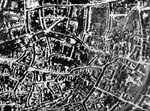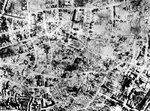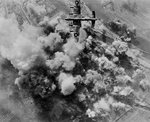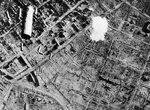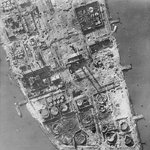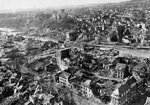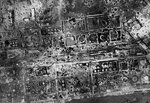- Thread starter
- #41
I'll start from the bottom of your post and work my way up.
The Soviet rocket-interceptor Bi-2 wasn't any advance in technology. It was a worthless design and didn't see any service in or out of World War 2. Britain didn't intend of having rocket interceptors as they already had a much better propulsion system, which is far more advanced than rockets, the jet engine. The Soviet Union didn't have a single non-prop driven aircraft in World War 2 that operated. The British had the Meteor.
No, I've never said that Albert Speer was the only reason that Germany's war economy kept rising. The RAF and USAAF could have crushed Germany's oil production had the bombing offensive been kept up. They had realised by 1944 where the key to Germany's war was.
This in no way implies that all bombing efforts before then had done nothing to the effort of Germany's war. Think logically, the destruction of a factory with several hundred aircraft airframes, engines, tank chassis, ball bearings or rifles has destroyed that production run which will have to be built again.
Of course, they did get built again but in the time it takes to re-build that same production run they would have built another production run if the bombing had never happened.
The destruction of oil installations, manganese plants and actual tank production facilities does more damage to the Wehrmacht than actually destroying them on the field. What good is German mobilisation without fuel?
The correct figures for the aerial bombardment of Germany was for every one soldier killed, three civilians were killed.
July 1944 was not the peak of Allied bombardment, on the contrary it was the first 4 months of 1945 that was, where the RAF alone dropped 181, 740 tonnes (The US dropping 188, 573 tonnes). Between July and September 1944 only 20 percent of Bomber Command's sorties were against cities, 11 percent being against oil installations. That's 69% of Bomber Command's sorties going directly against factories, ground forces, transport links or supply lines.
The effect of bombing Germany's oil: In March 1944 Germany had 927,000 tons of Petroleum. In May, 715,000 tons. 472,000 tons in June. Luftwaffe aviation spirit dropped from 180,000 tons in April to 50,000 tons in June, 10,000 tons in August!
Germany needed 300,000 tons of oil a month to effectively continue the war. By September 1944 they were receiving little over 150,000.
I have noticed how quickly this has become a thread about you trying to downplay the role of the Western Allied air offensive. I don't like having to repeat myself, let alone the words of someone else twice but you obviously did not read them.
In the words of Max Hastings "It would be ludicrous to imply that the German people found the experience acceptable, or to deny that Hitler's war production suffered not only from damage on plant, but also from absenteeism and chronic dislocation to the lives of the labour force."
It is unfortunate because I merely started out as showing that the RAF was more rounded, better equipped, better trained and elite force than the VVS which purely relied on numbers.
Let's compare the forces:
Night bombing: Lancaster/U-2 (RAF/VVS)
Night Fighting: Mosqutio/None (RAF/VVS)
High Altitude: Spitfire Mk.VI or Mk.XIV/MiG-3U (RAF/VVS)
Low Altitude: Spitfire Mk.XIV C.W/La-7 (RAF/VVS)
Ground Attack: Typhoon/Il-2 (RAF/VVS)
Strategic bombing: Lancaster/Pe-8 {Hardly in service} (RAF/VVS)
Jet/Rocket interceptors: Meteor/Bi-2 {Never saw service} (RAF/VVS)
Maritime Patrol: Sunderland/None (RAF/VVS)
Photo Reconaisance: Spitfire PR.IX/Po-2
Anyone can feel free to include other areas.
The Soviet rocket-interceptor Bi-2 wasn't any advance in technology. It was a worthless design and didn't see any service in or out of World War 2. Britain didn't intend of having rocket interceptors as they already had a much better propulsion system, which is far more advanced than rockets, the jet engine. The Soviet Union didn't have a single non-prop driven aircraft in World War 2 that operated. The British had the Meteor.
No, I've never said that Albert Speer was the only reason that Germany's war economy kept rising. The RAF and USAAF could have crushed Germany's oil production had the bombing offensive been kept up. They had realised by 1944 where the key to Germany's war was.
This in no way implies that all bombing efforts before then had done nothing to the effort of Germany's war. Think logically, the destruction of a factory with several hundred aircraft airframes, engines, tank chassis, ball bearings or rifles has destroyed that production run which will have to be built again.
Of course, they did get built again but in the time it takes to re-build that same production run they would have built another production run if the bombing had never happened.
The destruction of oil installations, manganese plants and actual tank production facilities does more damage to the Wehrmacht than actually destroying them on the field. What good is German mobilisation without fuel?
The correct figures for the aerial bombardment of Germany was for every one soldier killed, three civilians were killed.
July 1944 was not the peak of Allied bombardment, on the contrary it was the first 4 months of 1945 that was, where the RAF alone dropped 181, 740 tonnes (The US dropping 188, 573 tonnes). Between July and September 1944 only 20 percent of Bomber Command's sorties were against cities, 11 percent being against oil installations. That's 69% of Bomber Command's sorties going directly against factories, ground forces, transport links or supply lines.
The effect of bombing Germany's oil: In March 1944 Germany had 927,000 tons of Petroleum. In May, 715,000 tons. 472,000 tons in June. Luftwaffe aviation spirit dropped from 180,000 tons in April to 50,000 tons in June, 10,000 tons in August!
Germany needed 300,000 tons of oil a month to effectively continue the war. By September 1944 they were receiving little over 150,000.
I have noticed how quickly this has become a thread about you trying to downplay the role of the Western Allied air offensive. I don't like having to repeat myself, let alone the words of someone else twice but you obviously did not read them.
In the words of Max Hastings "It would be ludicrous to imply that the German people found the experience acceptable, or to deny that Hitler's war production suffered not only from damage on plant, but also from absenteeism and chronic dislocation to the lives of the labour force."
It is unfortunate because I merely started out as showing that the RAF was more rounded, better equipped, better trained and elite force than the VVS which purely relied on numbers.
Let's compare the forces:
Night bombing: Lancaster/U-2 (RAF/VVS)
Night Fighting: Mosqutio/None (RAF/VVS)
High Altitude: Spitfire Mk.VI or Mk.XIV/MiG-3U (RAF/VVS)
Low Altitude: Spitfire Mk.XIV C.W/La-7 (RAF/VVS)
Ground Attack: Typhoon/Il-2 (RAF/VVS)
Strategic bombing: Lancaster/Pe-8 {Hardly in service} (RAF/VVS)
Jet/Rocket interceptors: Meteor/Bi-2 {Never saw service} (RAF/VVS)
Maritime Patrol: Sunderland/None (RAF/VVS)
Photo Reconaisance: Spitfire PR.IX/Po-2
Anyone can feel free to include other areas.


